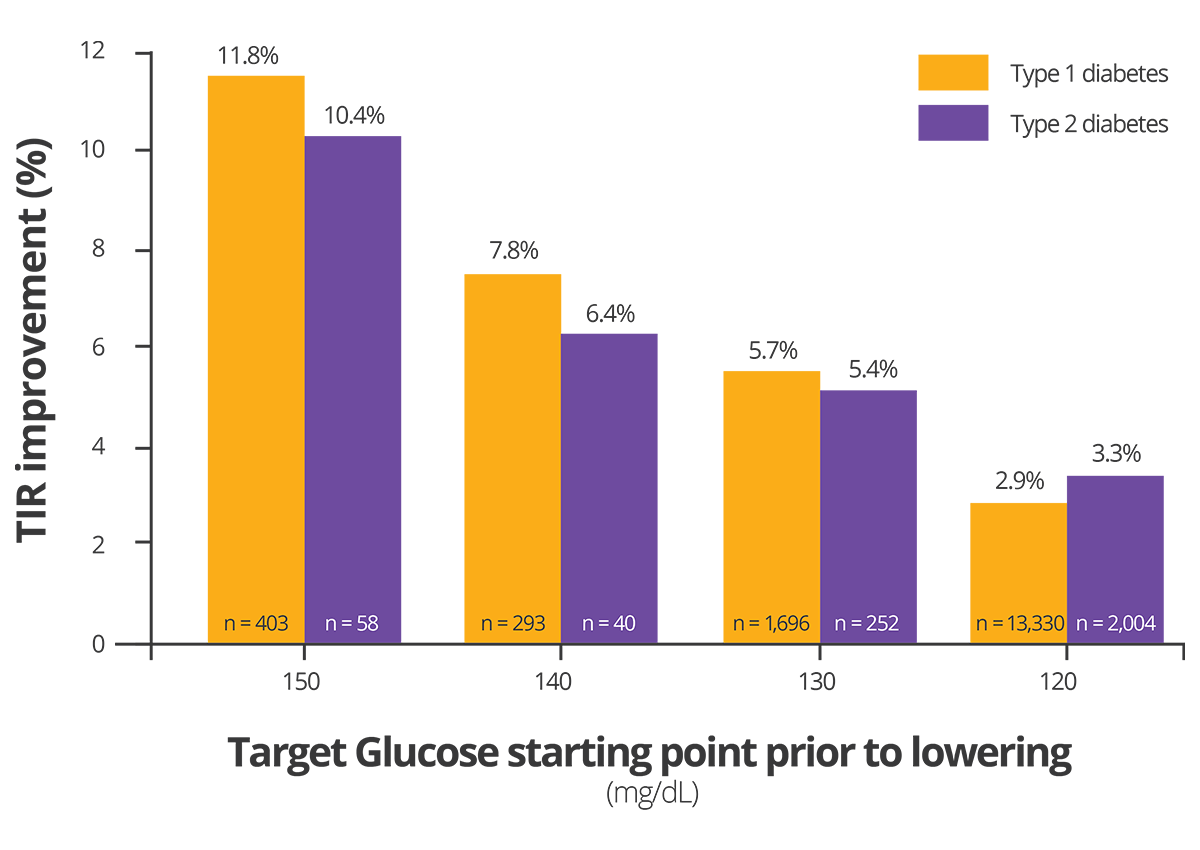Optimize for Outcomes with Omnipod® 5
Omnipod 5 real-world evidence demonstrated over


Time in range (TIR) with optimized settings1


Did you know?
53% of Omnipod 5 users not achieving glycemic targets do not frequently use the lowest Target Glucose setting of 110 mg/dL2
TIR improvement as Target Glucose setting is lowered to 110 mg/dL
Real-world users increased TIR by up to 12% by switching from the highest to the lowest Target Glucose setting with no clinically meaningful impact on time below range3.


Real-world insights to maximize TIR with Omnipod 5
Real-world data demonstrated the following settings can help to achieve optimal TIR1
| Setting | Optimized Value | Impact | |
|---|---|---|---|
1 | Target Glucose | 110 mg/dL (lowest setting) | Maximizes algorithm responsiveness |
2 | Insulin to Carb Ratio | ≤350/TDI | Optimize postprandial glycemia |
3 | Correction Factor | ≤1500/TDI | Improve efficacy of user-initiated corrections |
Leverage optimized settings for your Omnipod 5 patients: Small changes can lead to big improvements.
Learn more about
personalizing settings
“Practical considerations for using the Omnipod 5 Automated Insulin Delivery System:
Clinical experience from the United States and Europe”


In Diabetes, Obesity and Metabolism Volume 27, Issue 6 Jun 2025
By: Cari Berget, et al.
The authors provide a series of clinical vignettes illustrating advanced cases related to the initiation and ongoing optimization of insulin therapy using the Omnipod 5 system, including how to personalize settings and optimize glycemic outcomes in a variety of clinical circumstances.
If you are unable to find the information you are seeking or require additional information, please contact us.
1. Retrospective RWE data on file. 2025. Results shown for users with optimized settings including sufficient CGM data (≥75% of days with ≥220 readings), ≥90% time in Automated Mode, ≥5 bolus/day and an average Target Glucose of 110-115 mg/dL (6.1-6.4 mmol/L). Optimized settings: ISF x TDI ≤1500, I:C Ratio x TDI ≤350. RF-062025-00014.
2. Insulet data on file. 2025. Retrospective analysis including 103,369 T1D users with TIR (3.9-10.0 mmol/L or 70-180 mg/dL) <70%. 54,365 (53%) did not use the 110mg/dL (6.1mmol/L) target as their average glucose target setting. RF-062025-00038
3. Forlenza G, et al. Presented at: ATTD; March 19-22, 2025; Amsterdam, NL. Real-world data from 403 people with T1D aged 2+, and 58 people with T2D aged 18+ using the Omnipod 5 System who transitioned from the 150 mg/dL to 110 mg/dL Target Glucose. Each Target Glucose was used for a consecutive period of 14-90 days. Median time in Range (70-180 mg/dL) improved 11.8% (p<0.05), and median time <70 mg/dL +0.23% (p<0.05) for people with T1D. Median time in Range (70-180 mg/dL) improved 10.4% (p<0.05), and median time < 70 mg/dL +0.04% (non-significant) for people with T2D. Omnipod 5 results based on users with ≥75% of days with ≥220 readings available. Data on File. 05.15.25. RF-042025-00013
Omnipod 5 is indicated for people with type 1 diabetes, ages 2 years and older and type 2 diabetes in persons 18 years of age and older. Rx only. WARNING: Do not use SmartAdjust™ technology for people under the age of 2 or who require less than 5 U of insulin per day. Please see Omnipod.com/safety for important safety information.
INS-OHS-06-2025-00020 V4.0